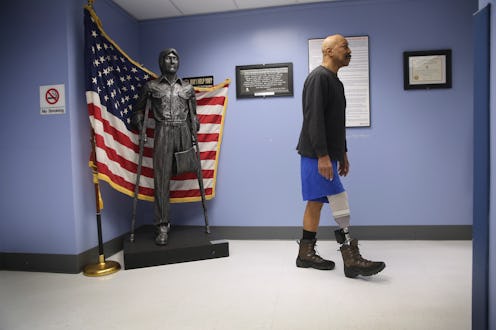News
The Hidden Cost Of A Ground War Against ISIS
Have you prepared yourself for the possibility of an American ground war against ISIS? If you've been listening to President Obama recently, probably not — the president has repeatedly insisted that no American ground troops will battle the militant Islamic group, and they'll instead provide support for the Iraqi military to do so. But if the words "mission creep" mean anything to you, than you probably know how fragile these kinds of promises can be. Last month, Army General Martin Dempsey said he would encourage Obama for ground troops if airstrikes didn't prove effective, meaning that, at the very least, the president could be under serious pressure from within to renege on his pledge.
There are many reasons to feel tense about this, beyond just the bloodshed that would inevitably follow full-scale U.S. military incursion against ISIS. If the last decade has proved anything, it's our inability to adequately address the issues facing veterans when they return — a problem which has loomed large in the political sphere recently, particularly with the scandal which has rocked the Veteran's Administration, or VA, and the sky-high rates of suicide among returning soldiers.
Just how big a problem is the suicide rate among veterans? A 2012 VA study of veteran suicides from 1999 to 2010 determined that an average of 22 veterans per day kill themselves, and that study didn't even use complete and comprehensive data. According to KDKA, CBS' Pittsburgh affiliate, the study only reviewed data from 21 states, and the VA is aware that the actual figure could be even higher.
As the Los Angeles Times points out, the issue isn't confined to recently returned soldiers — in fact, the majority of those daily suicides are by veterans who're over 50 years old.
And like many other avenues of society, there's seemingly a gender gap in veteran's services. A report released Wednesday by the group Disabled American Veterans laid bare a number of discrepancies in terms of how female veterans are handled compared to the male counterparts — from job training and housing, to health care, to the staggering prevalence of sexual assault in the military.
According to Joy Ilem, the group's national legislative director, the support simply isn't there. She wrote:
At a time when the number of women veterans is growing to unprecedented levels, our country is simply not doing enough to meet their health, social, and economic needs. ... [They] deserve equal respect, consideration, and care as the men who served, yet the support systems are ill-equipped to meet the unique needs of the brave women who have defended our country.
This is all essential background for when it comes time — or rather, if it comes time — for the U.S. to actually engage in a ground war against ISIS. It's always important to remember that war doesn't just leave a trail of wounded and deceased soldiers and civilians. It can also scar the people who make it out free from physical harm, and they need our support when they get home.
Images: Getty Images; Mission 22
